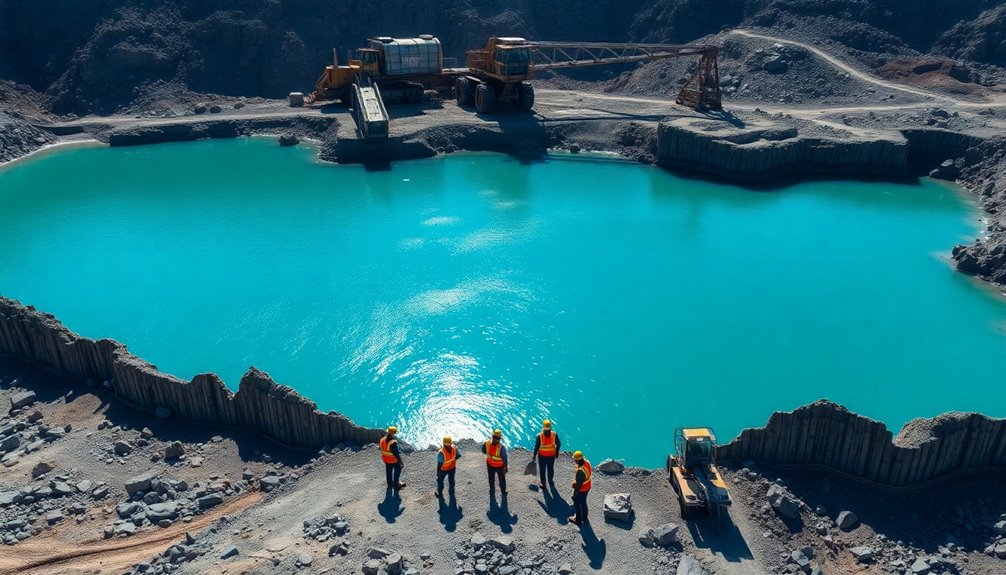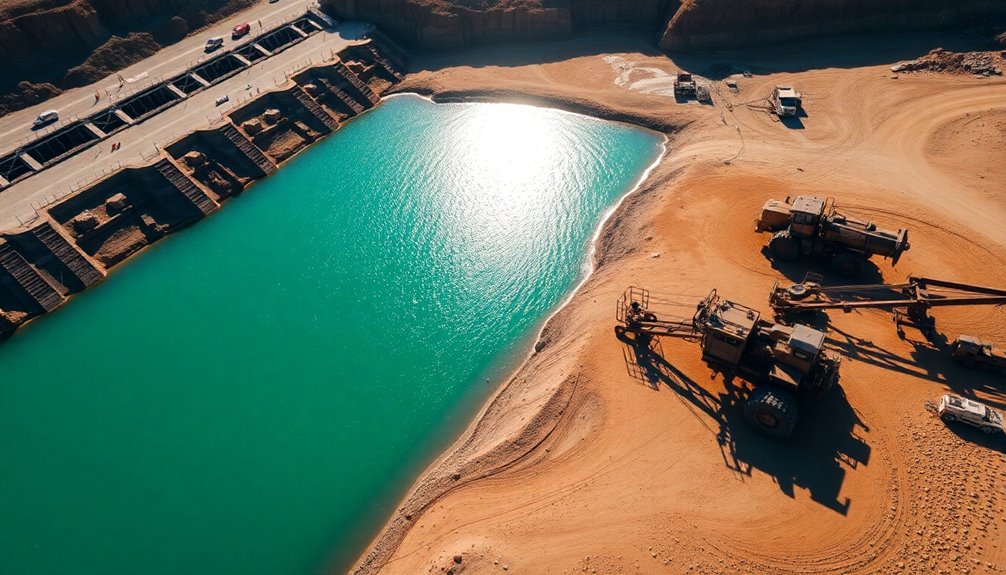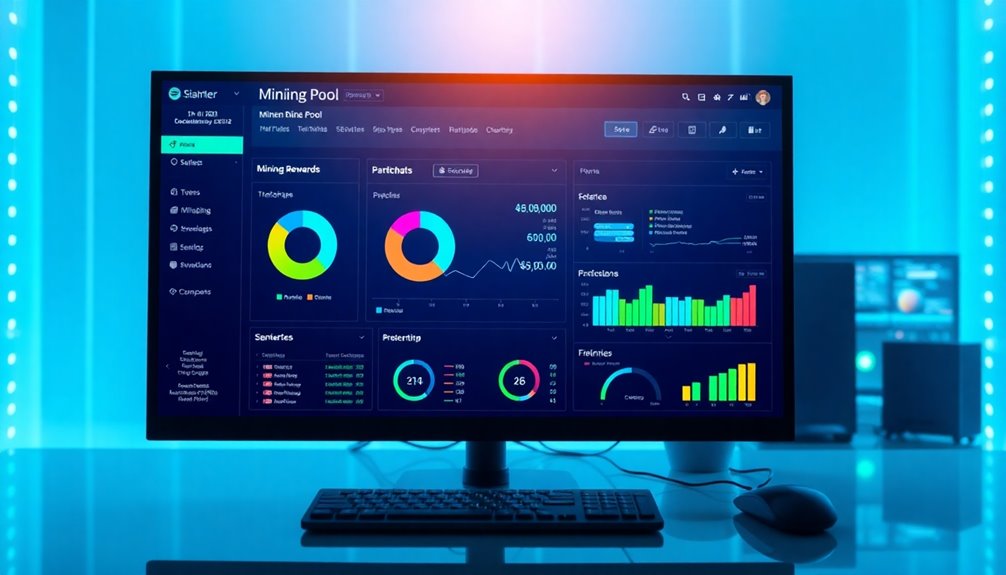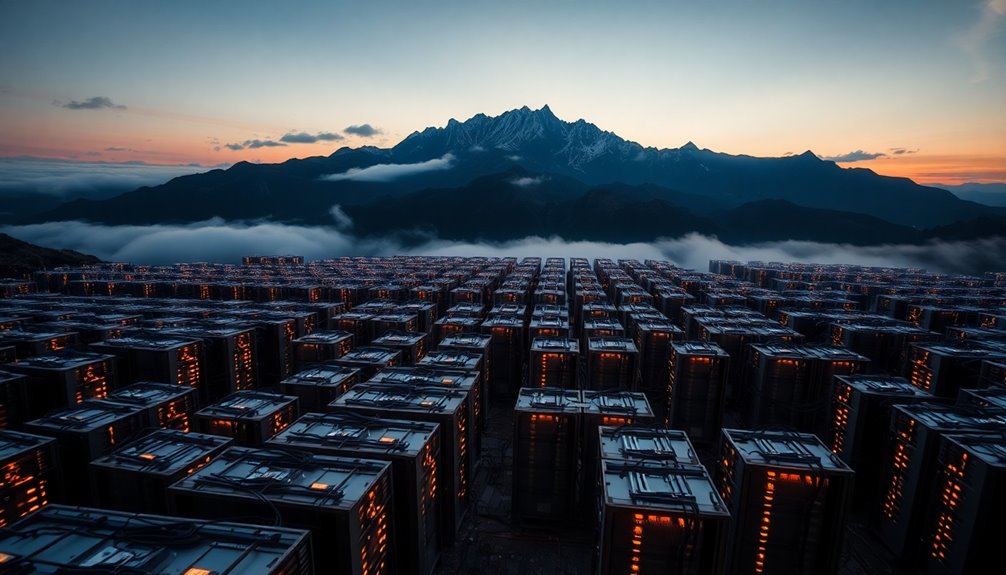A mining pool is a group of miners who combine their computational resources to increase their chances of successfully mining cryptocurrency blocks. By joining a pool, you reduce the payout variance commonly associated with solo mining, making your earnings more predictable. Pools typically use payout schemes like Pay Per Share (PPS) or Proportional (PROP) to distribute rewards based on your contribution. While this collaboration provides a more stable income, it also means sharing rewards with others. Interested in how different mining pool types work or which ones might suit your strategy? There's much more to discover!
Key Takeaways
- A mining pool is a group of miners who combine their computational resources to improve the chances of earning Bitcoin block rewards.
- The first mining pool, Slush Pool, was established in 2010, setting a standard for collaborative mining.
- Rewards in mining pools are distributed based on shares contributed, with common payout schemes like Pay Per Share (PPS) and Proportional (PROP).
- Mining pools lower entry barriers for new miners, making mining more accessible and providing more predictable income compared to solo mining.
- Major mining pools, such as F2Pool and Antpool, dominate the market, highlighting the importance of shared resources and expertise among pool members.
Mining Pool Essentials Explained

When you dive into cryptocurrency mining, understanding mining pools is crucial.
Mining pools are groups of miners who combine their compute resources to boost their chances of mining a Bitcoin block. By joining a pool, you reduce the variance in payouts and enjoy a more predictable income compared to solo mining. Each member contributes their hashing power, and rewards are distributed based on payout schemes like Pay Per Share (PPS) or Proportional (PROP).
The first mining pool, Slush Pool, paved the way for this collaborative effort in 2010. While mining pools enhance your earning potential, they also raise concerns about centralization and network security.
Keep an eye on transaction fees, as they can impact your overall rewards.
Mining Pool Significance Overview

Mining pools play a significant role in the cryptocurrency landscape by enhancing the efficiency and profitability of mining activities. By combining compute resources, individual crypto miners increase their chances of successfully mining blocks and earning block rewards.
This collaborative approach began with Slush Pool in 2010 and has grown, with major pools like F2Pool and Antpool dominating significant hashing power.
Mining pools lower entry barriers for new miners, making it more cost-effective than solo mining. They also provide shared expertise, allowing everyone to benefit from collective efforts.
Reward distribution typically involves systems like Pay Per Share (PPS), ensuring proportional payout based on individual contributions, which further incentivizes participation and boosts overall mining success.
Reward Distribution Mechanism

Understanding the reward distribution mechanism in mining pools is essential for any miner looking to maximize their earnings. In these pools, miners receive rewards based on the shares they contribute during the mining process.
Common payout schemes include Pay Per Share (PPS) and Pay Per Last N Shares (PPLNS), each offering different structures for reward distribution. Typically, earnings are proportional to the number of shares submitted, which means your payout can vary depending on the pool's performance and successful mining efforts.
Most pool operators charge a fee ranging from 1% to 3% of total rewards before distribution. Transparency is crucial, as many pools provide real-time statistics and detailed payout reports, ensuring trust among miners regarding their computational resources and earnings.
Pros and Cons Summary

While joining a mining pool can enhance your chances of receiving consistent rewards, it's essential to weigh both the advantages and disadvantages.
On the pro side, mining pools combine computational power, allowing cryptocurrency miners to stabilize income and lower entry barriers by providing access to shared resources and expertise. You'll benefit from real-time statistics that help optimize your earnings.
However, the cons include reduced individual earnings since rewards are shared among members. You also rely on pool operators for reliability and payout structure.
Additionally, centralization can occur when dominant pools control significant hashing power, which poses risks to network security and undermines the decentralized nature of cryptocurrencies.
Balancing these pros and cons is crucial for your mining strategy.
Mining Pool Types Evaluated

When choosing a mining pool, it's crucial to evaluate the different types available, as each offers distinct benefits and drawbacks.
Pay-per-Share (PPS) pools provide fixed payouts per share, ensuring consistent earnings, while Pay-per-Last-N-Shares (PPLNS) rewards loyalty by distributing payouts based on the last N shares submitted.
Proportional (Prop) pools adjust rewards based on individual contributions, resulting in variable payouts.
Hybrid mining pools blend multiple payout methods, catering to different risk tolerances.
On the other hand, Peer-to-Peer (P2P) mining pools decentralize control, enhancing transparency and reducing fraud risk.
However, larger mining pools often lead to centralization concerns, which can threaten network security, impacting all miners in the ecosystem.
Choose wisely to align with your goals!
Profit-Sharing Discrepancies

Profit-sharing discrepancies in mining pools can significantly impact your earnings, particularly when comparing different payout structures. Options like Pay-per-Share (PPS) and Pay-per-Last-N-Shares (PPLNS) affect how much you earn based on your contributions and when you submit shares.
Keep in mind that pools typically charge fees ranging from 1% to 3%, which can further skew your net payouts. Larger, dominant pools might offer consistent earnings but could reduce individual payouts due to centralization of mining power, impacting fairness for smaller miners.
Additionally, variability in mining difficulty and the frequency of block discoveries can lead to fluctuations in profit-sharing. It's crucial to evaluate historical performance and payout consistency before choosing a mining pool to maximize your returns.
Emergence of Decentralized Mining Pools

As the cryptocurrency landscape evolves, decentralized mining pools have emerged as a compelling alternative to traditional centralized options. Without a central authority, these pools empower individual miners to control their contributions and rewards.
Utilizing a peer-to-peer network structure, participants run full nodes, enhancing the secure mining process and ensuring transparency. This innovation addresses centralization concerns, where dominant pools could threaten network security and fairness.
Decentralized mining pools introduce innovative reward distribution mechanisms that promote manipulation resistance and equity. By fostering a more democratic mining ecosystem, they reflect a growing trend towards greater autonomy for miners.
Ultimately, decentralized mining pools not only enhance transparency but also contribute to a more resilient cryptocurrency landscape.
Consider Pool Reputation History

Understanding the reputation history of a mining pool can significantly influence your decision-making process. Established pools like Slush Pool and F2Pool, active since the early 2010s, demonstrate reliability that's hard to overlook.
Look for pools with a transparent operating history, especially regarding payout structures and any previous security breaches, as this transparency fosters trust among miners. Community feedback on platforms like Reddit can provide valuable user experiences, revealing insights into a pool's performance over time.
Additionally, assessing how a pool responds to challenges—like payout issues—shows its adaptability. A pool's market share, with large players like Antpool and Foundry, often indicates strong pool reputation and trust, reflecting their consistent reliability in the mining landscape.
Frequently Asked Questions
Is It Worth Joining a Mining Pool?
Joining a mining pool can definitely be worth it if you're looking for more consistent earnings. By pooling resources, you increase your chances of regular payouts, especially if your own computational power is limited.
However, keep in mind the pool fees that might cut into your profits. Weigh the benefits of shared expertise and resources against potential drawbacks like centralization risks to decide if it aligns with your mining goals.
Are Mining Pools Safe?
Mining pools present potential perils, primarily due to poor practices and centralized control.
You've got to stay savvy; trust is crucial. If you choose a reputable pool with robust security measures, your risks decrease significantly.
Watch out for pool hopping—it can wreak havoc on your earnings. Regular audits and transparent operations are key.
Ultimately, while mining pools can be safe, it's your responsibility to thoroughly research and select wisely.
What Mining Pool Should I Use?
When choosing a mining pool, consider ones with strong reputations like Slush Pool or F2Pool.
Evaluate their fee structures, as even a small percentage can impact your earnings.
Look for payout models that suit your needs, such as PPS or PPLNS, to manage your risk.
Also, research the pool's size and hashrate, and check community reviews to ensure you're comfortable with their performance and support.
Your choice matters for your mining success!
Does It Cost Money to Join a Bitcoin Mining Pool?
Joining a Bitcoin mining pool typically doesn't cost you anything upfront, but you'll likely pay a percentage of your earnings, usually between 1% to 3%.
Keep in mind that while there aren't direct fees to join, you'll still incur costs for your mining hardware, electricity, and internet connection.
It's wise to compare different pools and their fee structures, as these can significantly affect your overall profitability in Bitcoin mining.
Conclusion
In the world of cryptocurrency, joining a mining pool can be a game-changer for your profits. With their ability to combine resources and share rewards, these pools offer both security and efficiency for miners. But, have you considered the potential pitfalls, like reputational risks and profit-sharing discrepancies? Ultimately, choosing the right mining pool can significantly impact your returns, so weigh your options carefully. Dive in, do your research, and find a pool that aligns with your goals!









